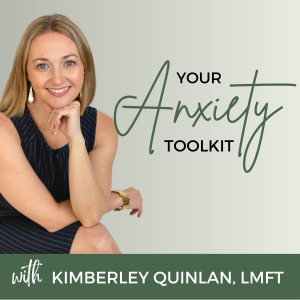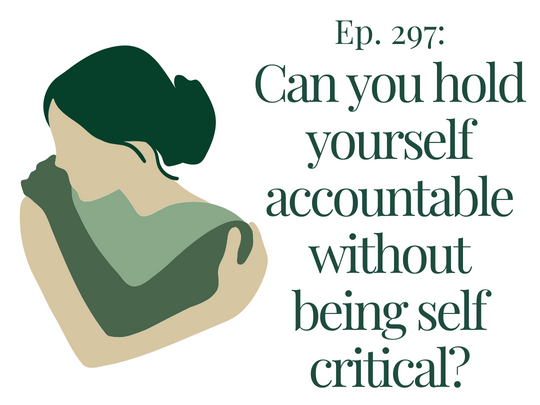
Your Anxiety Toolkit - Anxiety & OCD Strategies for Everyday
Health & Fitness:Mental Health

Ep. 297 Can You Hold Yourself Accountable Without Being Self-critical?
 2022-08-12
2022-08-12
This is Your Anxiety Toolkit - Episode 297.
Welcome back, everybody. How are you really? Just doing a quick check-in.
I love the quick check-in, the drop down into your chest, the drop down into whatever discomfort you may be having. And just take it a minute to actually check-in. So important. How often are you doing this? Hopefully, multiple times every day.
All right. Today, we are talking about accountability, and this actually came, I was listening to something. I can’t remember even what it was, but someone was having a strong reaction to the word “accountability,” which words matter. They really, really do. But what I think is more important is the meaning in which we place on words. It’s a huge part of diffusing from what we tell ourselves all day. So, the whole point of today is to talk about this important treatment concept or recovery concept. And I’ll come back to why. But it’s so important. It’s so, so important. I’ve got a couple of different views about certain things, so you’ll have to hang with me each. Everyone is so important, but hang with me.
Before we do that, let’s first do the review of the week. This is from Maggie Paulson. Maggie wrote:
“I love this podcast. I’ve never been diagnosed with OCD, but I recognize that I have anxiety. This podcast has helped me to learn more about how my brain works, and her gentle and loving approach to treatment has helped me learn to handle my intrusive thoughts and my anxiety. To say that has improved the quality of my life is an understatement. I’m very grateful for Kimberley and her podcast.”
Thank you, Maggie. You fill up my heart. Thank you so much for your reviews. All of you, even if you just click the five-star review or however many stars you think it deserves. You don’t even have to write a review. You can just give it stars, and that helps me. So, thank you so much.
All right, drum roll. We have the “I did a hard thing” segment. This is from Anonymous. Anonymous said:
“Today, I manage not to lapse into a behavioral addiction that I’ve been struggling with for over a year. It’s very easy for me to use this addiction as a coping strategy for the stresses in my life. But I realized today that a good life free of this addiction is better than a good feeling that only lasts momentarily.” Oh my gosh, Anonymous, I want to give you a standing applause right now. “Although every day is going to be challenging when it comes to not lapsing into addiction, if I take each day as it comes and have the attitude that it’s a beautiful day to do hard things, I know I can live addiction free.”
So good. So good, Anonymous. Oh my gosh, lLet me read this line again. It says, “I realized today that a good life free of this addiction is better than a good feeling that only last momentarily.” So much wisdom in that sentence. Amazing. So much wisdom. That is true for all of us. Isn’t it? So true for all of us in that we just-- the real living we want, the real pieces on the other side of that hard thing. So, so true. Thank you so much, Anonymous, and thank you so much to Maggie Paulson for that amazing review.
All right, folks, here is something I want to first start with. So, we’re talking about, can you hold yourself accountable without being self-critical? That’s a really important question because, and the reason it’s so important for recovery is, unless you’re in an intensive treatment center, where you have services 24/7, chances are, you’re doing a lot of this hard work. You’re doing a lot of these “hard things” on your own. And in order to do a hard thing, you do have to be accountable. You have to generate. If you could see me, you can see me like my arms are moving like cogs are turning. You have to generate motivation to do these hard things, because the truth is, no one wants to do these hard things. That’s why they’re hard. I don’t blame you if you don’t want to do hard things today because hard things suck. I keep saying that lately and I mean it. It’s hard. I don’t want to discount and make this podcast out to be like, “Oh, it’s just easy. Just do these five mindful things and you’re going to be fine.” No, it’s hard work. You have to generate motivation and you have to generate accountability. The accountability is what gets you to do it, even though you don’t want to do it.
And here is the point I want you to really take from this episode. Hopefully, this is a shorter episode, because I know I’ve been going a little longer lately. I’m a bit chatty. I’m chattier lately. I don’t know why. Here is the point. Being accountable is not synonymous with blame and harsh treatment. So, let me put that same concept into different words. Holding yourself accountable doesn’t mean the same as blaming yourself, beating yourself into doing the thing that you said you were going to do. That’s not accountability. Accountability is just holding yourself accountable to do the thing. Saying have some accountability doesn’t mean treat yourself terribly. And as I was saying at the beginning, I had heard something and I don’t even remember where. I’m assuming it was on Instagram. They were saying like, “Don’t tell me to be accountable. That’s just mean. That’s just mean that you would ask me to be accountable.” And I’m over here going, what? No, hun, someone somewhere you’ve picked up the idea or someone’s taught you that accountability means getting whipped and that isn’t true. That’s not true.
Accountability, we just last session, last episode did 196. It was about, what is your recovery goal? So, we got really clear about what do you want your life to look like. If you haven’t listened to that, please go back and listen to it. So, we got really clear on that. And accountability is saying, I love myself so much, and I love those recovery goals so much that I’m going to do this thing. That’s accountability. I value my well-being so much. I value that goal that I want for myself. I believe in myself so much that I’m going to do that thing. That hard thing. It’s not whipping and beating. It’s not mean words. It’s not saying get off your butt your lazy thing. That’s self-criticism. That’s not accountability. That’s just bullying. That’s self-bullying.
And so, what I want you to look at is, accountability is simply saying, I’m going to do the thing I said I’m going to do because I deserve it. I deserve the outcome, the dream, the goal, the life that lines up with my values. Accountability isn’t saying, push through no matter what, no matter how much pain you’re in, just like plow through it. Believe me. I’ve been there. I’ve been there. Sometimes you have to do that. I’m not going to say that that’s particularly even wrong because sometimes we do have to push through, but you don’t have to be mean. And it’s asking yourself, how willing am I to show up and do this hard thing so I can get this goal? Exactly like Anonymous said in this “I did a hard thing” segment. That’s accountability. Everything that Anonymous said is accountability. I should have actually-- sorry, Anonymous. I should have just read your “I did a hard thing” and said, “There you go, folks. That’s the episode. That’s what accountability looks like.”
So, it’s accountability. Compassionate accountability will still get you across the finish line. Often when I talk to clients about roadblocks to self-compassion, they’ll say, “Well, I won’t get up and do it if I don’t beat myself up.” Is that you? Maybe I should ask that question. Does that resonate with you? Like, “I won’t get to the gym. I won’t exercise. I won’t do the exposure unless I beat myself up. That’s the only form of transportation to get myself to do the thing.”
If that’s the case, please make today the day that you start trying something else. I’ll tell you why real quick and then I’m going to finish up. Yes, there are times when being self-critical gets you to do the thing. And if that’s what it takes, it’s up to you. You get to choose. I’m not going to tell you what’s wrong. I’m not going to tell you you are wrong. I don’t want you to feel judgment about that from yourself or from me because we’re all doing the very best we can with what we have. So, that’s totally fine. But if you use that as your only way, the chances are, eventually, it’s going to burn you out. You’re going to start to feel so bad about yourself that you will give up. We’ve got all the research and science to back it.
So, it’s only short-lived. This is only going to work for a certain amount of time until it stops working. So, let’s use today to try something different. Let’s put eggs in different baskets. Let’s practice compassionate accountability.
Again, I’ll say it, compassionate accountability is doing the thing that you set out to do, because you love yourself and you love your goals so much that you’re willing to do the hard thing. That’s it. That’s it, friends. That’s all I got to say.
All right. I love you. Have a wonderful day. I just love you. I’m squeezing my fist. I just love you guys. Thank you for being a part of my community. Thank you for supporting me. I totally understand you have gazillions of options for podcasts and gazillions of people who are probably doing great things. Thank you for letting me be a part of your journey. It’s an honor. Really it is.
Have a wonderful day.
More Episodes
 2024-10-08
2024-10-08
 2024-08-30
2024-08-30
 2024-08-23
2024-08-23
 2024-07-19
2024-07-19
Create your
podcast in
minutes
- Full-featured podcast site
- Unlimited storage and bandwidth
- Comprehensive podcast stats
- Distribute to Apple Podcasts, Spotify, and more
- Make money with your podcast
It is Free
- Privacy Policy
- Cookie Policy
- Terms of Use
- Consent Preferences
- Copyright © 2015-2024 Podbean.com




